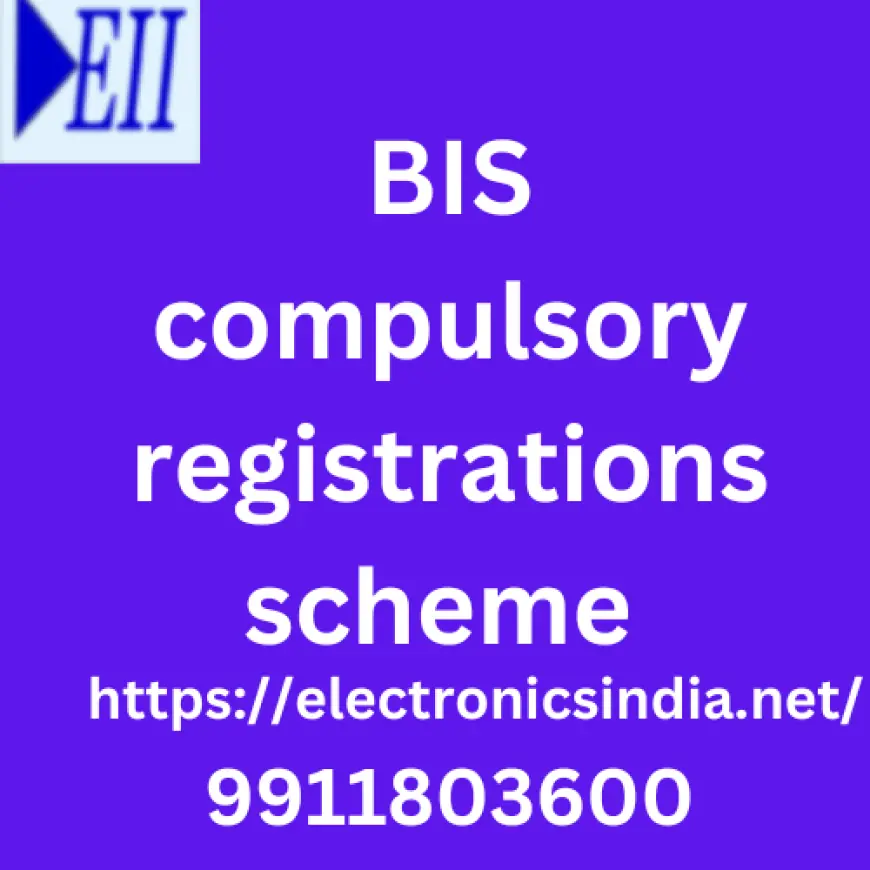BIS compulsory registrations scheme
BIS Compulsory Registration Scheme is mandatory for electronics in India. Find out how to obtain BIS certification and ensure product compliance.

The BIS Compulsory Registration Scheme (CRS) is a certification system introduced by the Bureau of Indian Standards (BIS) to ensure the safety and quality of electronic and IT products sold in India. The scheme was launched in 2012 under the Electronics and Information Technology Goods (Requirement for Compulsory Registration) Order, 2012, issued by the Ministry of Electronics and Information Technology (MeitY). The primary objective of the BIS Compulsory Registration Scheme is to regulate and standardize products that have a direct impact on consumer safety.
What is the BIS Compulsory Registration Scheme (CRS)?
The BIS Compulsory Registration Scheme requires manufacturers, both domestic and international, to obtain a BIS CRS certificate before selling their products in the Indian market. Under this scheme, manufacturers must test their products in a BIS-approved laboratory and ensure compliance with Indian safety standards. Once the product meets the necessary standards, it is granted a BIS registration, allowing it to be legally sold in India.
Products Covered Under BIS CRS
The BIS Compulsory Registration Scheme covers a wide range of electronics and IT products, including:
-
Mobile phones
-
Laptops and tablets
-
LED televisions
-
Power adapters
-
Electronic musical systems
-
Wireless keyboards
-
Smartwatches
-
Set-top boxes
The BIS Compulsory Registration Scheme list is periodically updated by MeitY, adding new products that require mandatory BIS certification.
Process to Obtain BIS CRS Certification
To obtain a BIS CRS certificate, manufacturers must follow these steps:
-
Identify the Product Category: Check whether the product falls under the scope of the BIS Compulsory Registration Scheme.
-
Testing in BIS-Approved Lab: The product must be tested in a BIS-recognized laboratory to ensure compliance with relevant Indian Standards (IS).
-
Submit Application to BIS: After receiving the test report, the manufacturer must apply for BIS CRS registration through the BIS online portal.
-
Grant of Registration: If the application and test reports are satisfactory, BIS issues the CRS certificate, allowing the manufacturer to use the BIS Standard Mark on their product.
-
Renewal and Compliance: The registration is valid for two years and must be renewed periodically. BIS CRS compliance includes periodic surveillance and retesting to ensure continuous adherence to standards.
Importance of BIS CRS Registration
The BIS Compulsory Registration Scheme is essential for:
-
Consumer Safety: Ensures that electronic products meet safety standards and do not pose hazards.
-
Market Access: Allows manufacturers to sell their products legally in India.
-
Quality Assurance: Promotes high-quality manufacturing practices.
-
Avoiding Legal Penalties: Selling non-registered products can lead to legal action and penalties.
Conclusion
The BIS Compulsory Registration Scheme plays a crucial role in ensuring product safety and quality in India’s electronics market. Manufacturers must comply with BIS CRS regulations to avoid penalties and gain consumer trust.
What's Your Reaction?
 Like
0
Like
0
 Dislike
0
Dislike
0
 Love
0
Love
0
 Funny
0
Funny
0
 Angry
0
Angry
0
 Sad
0
Sad
0
 Wow
0
Wow
0













































